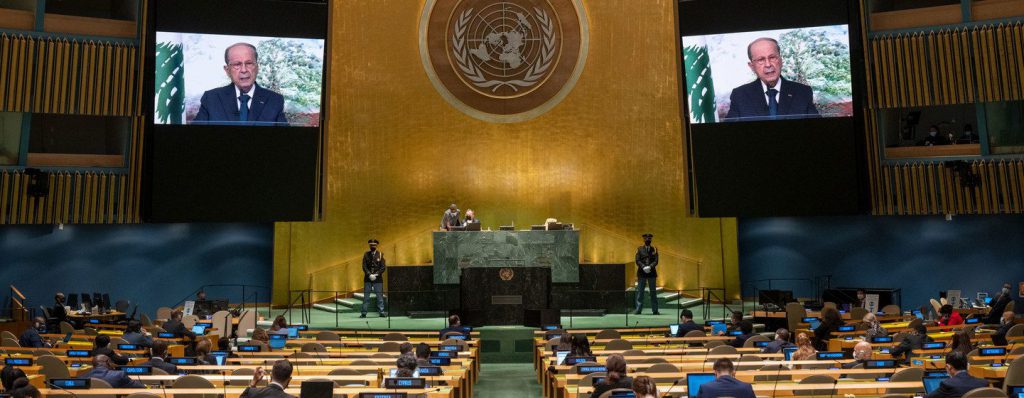Lebanese President Michel Aoun said big challenges await Lebanon’s new government in a recorded video message to the United Nations General Assembly on Friday.
The president added that the country will be in need of funding from the international community to revive the economy. “We are relying on the international community to fund vital projects, whether in the public or private sector, to revive the economic cycle and create new job opportunities,” said Aoun.
He also assured world leaders that the new government would earn the confidence of both Lebanese citizens and the international community by committing to carry out pressing reforms, fight corruption, and implementing a safety net plan.
“Lebanon has embarked on a new phase that would hopefully mark a promising step on the path of recovery,” said Aoun about the formation of the government.
Prime Minister Najib Mikati was able to succesfully form a government this past month, ending 13 months of political deadlock and dead-end negotiations as the country sinks deeper into its worst financial and economic crisis to date.
Mikati promised to resume talks with the International Monetary Fund (IMF), which the previous government was in the midst of. He also promised to pursue the necessary reforms, which are an essential prerequisite for foreign aid to flow into the country.
“Lebanon, which is stubbornly trying to pave its way towards recovery, is relying on international support to achieve its goals,” said Aoun.
The president pinpointed how “financial and economic policies adopted for decades and built upon the profit-based pattern, in addition to corruption and waste that result from bad management and absence of accountability, pushed Lebanon into an unprecedented financial and monetary crisis.”
Aoun also focused on “the catastrophic outcomes” of displaced Syrians in his address and asked the international community to secure their safe return home.
He also reiterated Lebanon’s position of rejecting additional Palestinian refugees “based on the necessity to find a solution to the Palestinian issue,” adding that Israeli threats and transgressions are also a main concern for the country.
On the same day, French President Emmanuel Macron welcomed the Lebanese prime minister to Paris on his first foreign trip since forming a government.
Macron urged Lebanese officials to implement urgent reform measures and push ahead with IMF talks as the country faces a “humanitarian emergency.”
The IMF talks hit a roadblock last summer after the financial recovery plan proposed by ex-Premier Diab’s government was resisted by many of the country’s top politicians and bankers.
The French president also pledged to “mobilize the international community to respond to the most urgent needs.”
“We have an opportunity to advance concretely on the path of reforms,” said Macron. “We are here. France will remain at the side of the Lebanese people.”
In return, Mikati assured Macron that he is determined to implement “the necessary and imminent reforms to regain confidence and give back hope to reduce the suffering of the Lebanese people” as soon as possible.
The World Bank classified Lebanon’s crisis as one of the deepest depressions of modern history.
